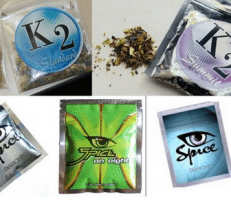
Local officials across the United States are attributing a rise in violent crime and emergency room admissions to a spike in synthetic marijuana, the profits from which are funneled to the Middle East.
CNN reports that according to the American Association of Poison Control Centers, 3,682 people reported feeling ill effects from the products known as K2, Spice, or Scoopy Snax. This year, these mixtures of unknown herbs sprayed with research-grade synthetic cannabinoids have already led to over 4,377 reports to poison control centers.
NYPD Commissioner Bill Bratton demonized the substances as “weaponized marijuana” in a press conference Tuesday, leading the NY Post to declare, “‘Weaponized weed’ triggering nude, psychotic rampages in NYC“.
“A number of individuals, when under the influence of this drug, are relatively impervious to pain and also have significant enhancement of their physical strength,” Bratton said. The department then released two videos to back up his point, except that one was a video from an episode of “Cops” from Iowa in 2003 where a man was suffering from the effects of PCP, not synthetic cannabinoids.
In Washington DC, police arrested a man on July 4 for the robbery and fatal stabbing of another man on the Metro train, attributing his psychosis to synthetic cannabinoids. “In some cities, synthetic cannabinoids is a huge issue, in other cities it’s just beginning to grow,” said Washington DC’s Police Chief Cathy Lanier on Monday. “Its connection to violence, that’s a gap that can be fixed.”
Lanier is meeting with other police chiefs in Washington DC this week. They are calling for new tests to help them identify users of synthetic cannabinoids in the field. And they will fail to get those tests and fail to reduce the use of synthetic cannabinoids until they recognize why people are choosing to use them.
Because synthetic cannabinoids are commercially available, legal to possess, and don’t show up on urine screen drug testing.
Spice, K2, and all the rest are often sold in bodegas and sometimes sold secretly, with customers using code words to access the product, since cities have been cracking down on their sale. Thus, it is easier and cheaper for someone seeking a marijuana high to find a five-dollar packet of Spice in a store than to risk finding a forty-dollar bag of weed from an illegal dealer.
Selling the synthetic cannabinoids is illegal, but possessing them is not. Thus, it is far less risky to get that Spice packet from a bodega clerk than taking the chance the illegal dealer is a narc or getting caught with illegal weed by the cops sometime later.
Even identifying the product as a controlled substance is difficult for law enforcement. As soon as officials define one particular synthetic cannabinoid as illegal, Chinese chemists just tweak the molecular structure until it no longer matches the illegal definition, but still gets the user high. Thus, any test the cops in DC might get to detect today’s Spice won’t detect next month’s version, just as the drug tests administered by employers, probation officers, and homeless shelters won’t work on most synthetic cannabinoids.
Only marijuana prohibition could lead people seeking a natural high to use an untested, impure, dangerous alternative like Spice, just as only alcohol prohibition could’ve led people seeking a buzz to drink denatured methanol. If we really want to end the synthetic marijuana epidemic, we must legalize the sale of natural marijuana and stop penalizing people for using it.






